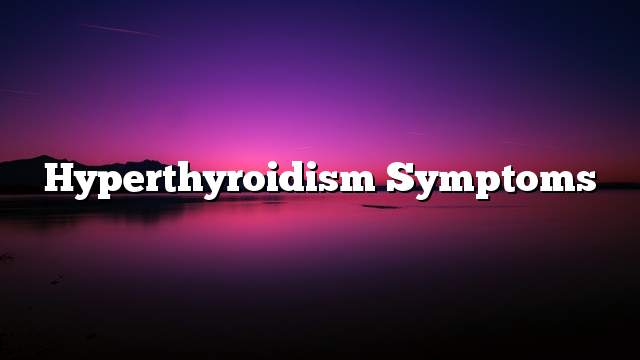Increased secretion of this hormone leads to the acceleration of the rate of activity of many organs of the body, leading to symptoms, the patient suffers from an increase in appetite and binge eating but there is also a decrease in weight as well as the patient suffers from chronic diarrhea, and symptoms that suffer Including nervous tremors, nervous irritability, anxiety, insomnia and difficulty sleeping due to hypernutrition of the nervous system
The patient also suffers from weakness of the muscles, inability to tolerate heat, panic and feeling of heart palpitations. Women also have periods of irregular menstruation, less frequent and less in quantity. Men may suffer from impotence, and the patient suffers from sweat from the hands and sweat the skin Prolonged, the patient suffers from lightness in the hair and weakness in the strength of nails
In the examination of the patient, it is noticed that the face is often red, as is noticeable in the eyes, especially in patients with Graves and accompanied by redness and inflammation in the eyes, may be noticed swelling in the neck when the examination, as noted sweating hand and hot when peace hands with the patient , And you may notice a flicker by placing a paper over the hand of the patient, and when examining the heart noticed an increase in palpitations.
The thyroid gland is one of the endocrine glands located at the bottom of the neck. Two hormones, thyroxine T4 and triiodothyron 3, are secreted. The function of their hormones is to regulate and accelerate vital activities throughout the body. Its disease results from increased secretion of these hormones, Or lack of secretion of these hormones called thyroid insufficiency
Symptoms of hyperthyroidism are many of the most important increase appetite and weight loss and diarrhea and increased heartbeat and menstrual cycle disorders in women. The symptoms of hypothyroidism are loss of appetite, weight gain, constipation, lethargy, etc. The diagnosis is based on the work of thyroid screening, T4 and T3 and thyroid stimulating hormone
Treatment of hypothyroidism is based on giving the patient fibotheroxine. Treatment of hyperthyroidism is a surgical, radiological and pharmacological treatment.
